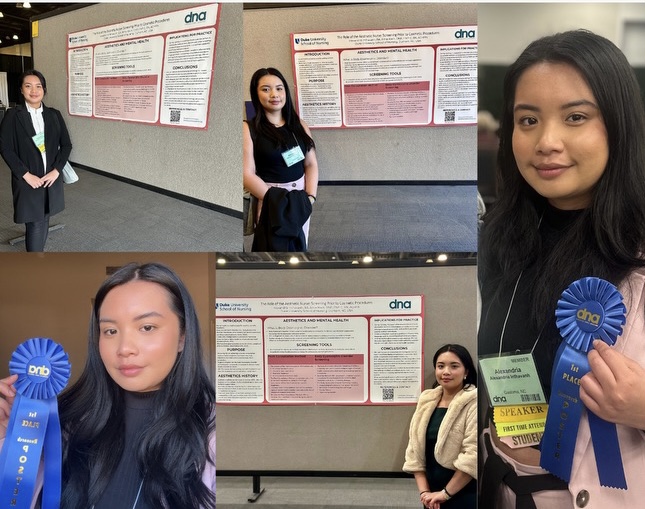ABSN Student Connects Dermatology and Mental Health During Poster Presentation
Duke School of Nursing ABSN Student Alexandria Inthavanh’s research highlights the need for mental health screenings in dermatology to enhance patient care and address health disparities.

Inthavanh said her inspiration for the poster came from the high volume of new nurses entering the cosmetic and dermatology industry who do not consider mental health when consulting patients about their expected outcomes. “Mental health is one of the many reasons why patients decide to undergo any cosmetic procedure and providers oftentimes overlook the screenings when there may be an underlying cause that may need other psychiatric treatment.”
She added, “I hope individuals who work in the dermatology and aesthetic industry will consider using the Peak Consultation Method and the Body Dysmorphic disorder screening when treating their patients. By taking the extra step to screen patients, we can help prevent unnecessary cosmetics procedures or treatment.”
Inthavanh said the conference was spectacular and extremely educational and led her to realize the Duke School of Nursing has an opportunity to enhance its nursing education when it comes to teaching students about the skin. “I was able to sit on lectures about T-cell Lymphoma, Pediatric Dermatology, Psoriasis, and so much more.”
She has worked with Associate Professor Amie Koch , DNP, FNP-C, RN, ACHPN on the importance of screening for mental health concerns while in a dermatology setting and breaking the negative stigma behind mental health screenings in the Aesthetic and Dermatology fields.
Inthavanh said she was amazed by the magnitude of peers who informed her that mental health is not heavily spoken about in Dermatology or Aesthetics. “I hope to further my research and provide more primary prevention methods and awareness to this unspoken topic.”
She hopes to share this experience with her colleagues and believes it can pioneer a greater change for Duke in filling healthcare gaps. “Specifically, through my experience and continuing this research, I believe I can help fill gaps in mental health awareness in dermatology and nursing dermatology education in higher education institutions,” Inthavanh said.
A major part of Inthavanh’s work at DUSON is centered on conducting mental health screenings before a cosmetic procedure and she said she hopes to help eliminate associated health inequalities by doing so. “Many patients do not fully understand the benefits and risks of procedures and there is often a gray area. While presenting at the conference, I asked each individual ‘have you ever been screened at a dermatology office, MedSpa, or plastic surgeon’s office for mental health,’ and every single individual answered no,” she said.
She continued, “this is a cause for concern as patients who have mental health conditions may need other psychiatric measures. One argument is that there is a negative connotation when asking patients about their mental health in the dermatology and cosmetic industry as it can deter clientele and limit revenue.”
Inthavanh said as industry nurses, it is imperative that they break the negative stigma about losing clients and money and make mental health consultations a normality. By doing so, nurses can prevent unwarranted procedures, prevent addictions, and treat other concerns patients may have.
“In my work to reduce these inequities, as a fourth semester student in the ABSN program, I created the Aesthetic and Dermatology Students organization. This organization aims to bridge schooling and the professional industry and support students in their education in Aesthetics and Dermatology,” she said. “The organization provides educational resources, trainings with professionals, and conference opportunities.”
Inthavanh is a native of Atlanta and resides in Charlotte, N.C., with her husband Nash and their 2-year-old daughter, Desa.